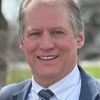Kat Abughazaleh
Kat Abughazaleh (Democratic Party) is running for election to the U.S. House to represent Illinois' 9th Congressional District. She is on the ballot in the Democratic primary on March 17, 2026.[source]
Abughazaleh completed Ballotpedia's Candidate Connection survey in 2025. Click here to read the survey answers.
On October 23, 2025, Abughazaleh was indicted on two charges related to protests at a U.S. Immigration and Customs Enforcement facility that she attended near Chicago. Click here to read more.
Biography
Kat Abughazaleh was born in Dallas, Texas. She earned a bachelor's degree from George Washington University in 2020. Her career experience includes working in journalism.[1]
2026 battleground election
Ballotpedia identified the March 17 Democratic primary for Illinois' 9th Congressional District as a battleground election. The summary below is from our coverage of this election, found here.
Kat Abughazaleh (D), Daniel K. Biss (D), Laura Fine (D), and 13 others are running in the Democratic primary for Illinois' 9th Congressional District on March 17, 2026. As of December 2025, Abughazaleh, Biss, and Fine led in fundraising and polling.
Incumbent Jan Schakowsky (D) is not running for re-election. As of December 2025, major election forecasters rated the general election Solid Democratic. This is the first election in the 9th District without an incumbent on the ballot since Schakowsky was first elected in 1998. Writing in Crain's Chicago Business, Greg Hinz described the primary as "an almost unpredictable cattle call of a race for Congress," citing the "millions of dollars in campaign cash, the fallout from Trump-inspired immigration raids, highly divisive Middle East politics and the impact of social media in a city known for old-school precinct politics."[2]
Abughazaleh is a former researcher and video producer with Media Matters for America, a group describing itself as "a web-based, not-for-profit, 501 (c)(3) progressive research and information center."[3][4] Abghazaleh says she is running "because the same old sh** isn't working — and it won't work to defeat Trump's agenda."[5] Abughazaleh said that "I've fought fascists before as a citizen, union rep, and independent journalist. Now, I'm going to do the same in Congress."[6]
Biss is the mayor of Evanston and a former state legislator. Biss ran for the Democratic nomination for governor in 2018. Biss says he is running "because we need Democrats who won't flinch, won't fold, won't forget what we're fighting for."[7] Biss' campaign website says he "has built coalitions and brought people together to solve problems that have gone unaddressed for too long...Daniel continues to stand up to Donald Trump on immigration, preserving access to abortion, expanding mental health services, and more."[8] Schakowsky endorsed Biss on January 7, 2026.[9]
Fine was elected to the Illinois Senate in 2018. Fine served six years in the Illinois House and worked in journalism. Fine says she is running "to continue her fight to make sure Illinois continues to have a champion in Washington that stands up for families, not special interests."[10] Fine's campaign website says: "For Laura, every bill, every battle, and every victory is personal – because she knows what it’s like to be the person counting on a system that too often says no."[11]
Also running in the primary are Bushra Amiwala (D), Phil Andrew (D), Natalie Angelo (D), Patricia Brown (D), Jeff Cohen (D), Justin Ford (D), Mark Fredrickson (D), Hoan Huynh (D), Bethany Johnson (D), Sam Polan (D), Nick Pyati (D), Howard Rosenblum (D), and Mike Simmons (D).
In the 2024 election, Schakowsky defeated Seth Alan Cohen (D) 68%–32%.
Elections
2026
See also: Illinois' 9th Congressional District election, 2026
General election
The candidate list in this election may not be complete.
The primary will occur on March 17, 2026. The general election will occur on November 3, 2026. Additional general election candidates will be added here following the primary.
General election for U.S. House Illinois District 9
Delila Barrera is running in the general election for U.S. House Illinois District 9 on November 3, 2026.
Candidate | ||
| Delila Barrera (Independent) | ||
 = candidate completed the Ballotpedia Candidate Connection survey. = candidate completed the Ballotpedia Candidate Connection survey. | ||||
| If you are a candidate and would like to tell readers and voters more about why they should vote for you, complete the Ballotpedia Candidate Connection Survey. | ||||
Do you want a spreadsheet of this type of data? Contact our sales team. | ||||
Democratic primary election
Democratic primary for U.S. House Illinois District 9
The following candidates are running in the Democratic primary for U.S. House Illinois District 9 on March 17, 2026.
 = candidate completed the Ballotpedia Candidate Connection survey. = candidate completed the Ballotpedia Candidate Connection survey. | ||||
| If you are a candidate and would like to tell readers and voters more about why they should vote for you, complete the Ballotpedia Candidate Connection Survey. | ||||
Do you want a spreadsheet of this type of data? Contact our sales team. | ||||
Withdrawn or disqualified candidates
- Miracle Jenkins (D)
- Jill Manrique (D)
- David Abrevaya (D)
- Tamika La'Shon Hill (D)
- Jan Schakowsky (D)
- Lauren Million (D)
- Natalie Angelo (D) (Unofficially withdrew)
- Bruce Leon (D)
Republican primary election
Republican primary for U.S. House Illinois District 9
Rocio Cleveland, John Elleson, Paul Friedman, and Mark Su are running in the Republican primary for U.S. House Illinois District 9 on March 17, 2026.
 = candidate completed the Ballotpedia Candidate Connection survey. = candidate completed the Ballotpedia Candidate Connection survey. | ||||
| If you are a candidate and would like to tell readers and voters more about why they should vote for you, complete the Ballotpedia Candidate Connection Survey. | ||||
Do you want a spreadsheet of this type of data? Contact our sales team. | ||||
Polls
- See also: Ballotpedia's approach to covering polls
Polls are conducted with a variety of methodologies and have margins of error or credibility intervals.[12] The Pew Research Center wrote, "A margin of error of plus or minus 3 percentage points at the 95% confidence level means that if we fielded the same survey 100 times, we would expect the result to be within 3 percentage points of the true population value 95 of those times."[13] For tips on reading polls from FiveThirtyEight, click here. For tips from Pew, click here.
Below we provide results for polls from a wide variety of sources, including media outlets, social media, campaigns, and aggregation websites, when available. We only report polls for which we can find a margin of error or credibility interval. Know of something we're missing? Click here to let us know.
| Poll | Dates | Abughazaleh | Amiwala | Andrew | Biss | Fine | Huynh | Leon | Simmons | Someone else | Other | Undecided | Sample size | Margin of error | Sponsor |
|---|---|---|---|---|---|---|---|---|---|---|---|---|---|---|---|
– | 14 | 4 | 4 | 21 | 21 | 2 | -- | 7 | -- | 3 | 23 | 500 LV | ± 4.4% | Laura Fine | |
– | 17 | 3 | 3 | 31 | 10 | 4 | 2 | 6 | 2 | -- | 21 | 500 LV | ± 4.4% | Daniel Biss | |
– | 18 | 6 | -- | 18 | 10 | 5 | -- | 6 | -- | 6 | 31 | 569 LV | ± 4.0% | ||
| Note: LV is likely voters, RV is registered voters, and EV is eligible voters. | |||||||||||||||
Election campaign finance
| Name | Party | Receipts* | Disbursements** | Cash on hand | Date |
|---|---|---|---|---|---|
| Kat Abughazaleh | Democratic Party | $2,705,176 | $1,894,223 | $810,953 | As of December 31, 2025 |
| Bushra Amiwala | Democratic Party | $957,628 | $456,009 | $501,619 | As of December 31, 2025 |
| Phil Andrew | Democratic Party | $1,210,786 | $249,373 | $961,414 | As of December 31, 2025 |
| Daniel K. Biss | Democratic Party | $1,984,528 | $608,224 | $1,376,305 | As of December 31, 2025 |
| Patricia Brown | Democratic Party | $0 | $0 | $0 | Data not available*** |
| Jeff Cohen | Democratic Party | $766,870 | $214,075 | $552,795 | As of December 31, 2025 |
| Laura Fine | Democratic Party | $1,921,415 | $481,445 | $1,439,970 | As of December 31, 2025 |
| Justin Ford | Democratic Party | $26,815 | $27,266 | $-817 | As of December 31, 2025 |
| Mark Fredrickson | Democratic Party | $0 | $0 | $0 | Data not available*** |
| Hoan Huynh | Democratic Party | $1,003,075 | $262,169 | $737,781 | As of December 31, 2025 |
| Bethany Johnson | Democratic Party | $2,579 | $486 | $2,093 | As of December 31, 2025 |
| Sam Polan | Democratic Party | $362,064 | $222,823 | $139,240 | As of December 31, 2025 |
| Nick Pyati | Democratic Party | $261,991 | $202,503 | $59,488 | As of December 31, 2025 |
| Howard Rosenblum | Democratic Party | $129,474 | $69,403 | $36,845 | As of December 31, 2025 |
| Mike Simmons | Democratic Party | $324,880 | $189,729 | $135,152 | As of December 31, 2025 |
|
Source: Federal Elections Commission, "Campaign finance data," 2026. This product uses the openFEC API but is not endorsed or certified by the Federal Election Commission (FEC).
* According to the FEC, "Receipts are anything of value (money, goods, services or property) received by a political committee." |
|||||
Satellite spending
- See also: Satellite spending
Satellite spending describes political spending not controlled by candidates or their campaigns; that is, any political expenditures made by groups or individuals that are not directly affiliated with a candidate. This includes spending by political party committees, super PACs, trade associations, and 501(c)(4) nonprofit groups.[14][15][16]
If available, this section includes links to online resources tracking satellite spending in this election. To notify us of a resource to add, email us.
| By candidate | By election |
|---|---|
Note: As of December 9, 2025, Natalie Angelo (D), Patricia Brown (D), and Mark Fredrickson (D) had not filed as candidates with the Federal Election Commission.
Endorsements
Abughazaleh received the following endorsements. To send us additional endorsements, click here.
- U.S. Rep. Ro Khanna (D)
- Fmr. U.S. Rep. Jamaal Bowman (D)
- A New Policy PAC
- Citizens Against AIPAC Corruption
- Gen-Z for Change
- Girl, I Guess
- Justice Democrats PAC
- No Dem Left Behind
- Progressive Victory
- Sunrise Movement
Campaign themes
2026
Ballotpedia survey responses
See also: Ballotpedia's Candidate Connection
Kat Abughazaleh completed Ballotpedia's Candidate Connection survey in 2025. The survey questions appear in bold and are followed by Abughazaleh's responses.
| Collapse all
I decided to run for Congress because I don't think Democrats are doing enough to stand against fascism, to make billionaires pay their fair share, and to protect the working class. And unfortunately, our leadership in the House of Representatives refuses to acknowledge the true impact that the far-right, the Internet, and working class struggles have on our country — and that's part of the reason Democrats keep losing elections.
I'm trying to run a progressive grassroots campaign that I can be proud of. I'm not taking a cent of corporate cash and I'm trying to spend our money in ways that help people now, rather than waiting to make a difference in my community until I'm elected. By making our events engaging, centered around mutual aid, and accessible to everyone no matter their income, my campaign is showing our values rather than providing lip service with nothing to show for it.
In my spare time, I like reading space operas, doing crafts like embroidery and knitting with my friends, and hanging out with my partner, Ben, and our cat, Heater.- ANTI-AUTHORITARIANISM
Donald Trump, tech billionaires, and the Republican Party have banded together to break this country. Their vision is fascist, one of a militarized country where only a few dozen rich men have a seat at the table. We will not and cannot let them win.
The Democratic strategy of cowering to this administration is not only morally reprehensible but it also won't work. Every authoritarian movement has shown us the only way to stand up to fascism is loudly, proudly, and every single day.
I have been doing that for my entire career thus far, and I won't stop in Congress. I will speak out, use what I have to slow this administration wherever possible. And I will make sure my constituents know they are not alone. - BASIC EXISTENCE My bold vision is that every American should be able to afford housing, healthcare, and groceries with money left over to save and spend (crazy, right?). This should be the lowest bar possible and it is for many of our peer countries. But in the United States, that idea is considered by many, particularly the richest and most powerful, to be a pipe dream. Our existence isn't merely a means of profit for the richest people in society. These ideas shouldn't be controversial and are at the very core of my campaign. We're often told that it's a lot more complicated than we think but it doesn't have to be. We deserve to thrive, not just survive — and every political leader should work towards that goal.
- DEMOCRATIC REFORM Our democracy is broken. Our current system functions too much on greed, rewards stagnation, and disincentivizes change. That's why we need a serious overhaul of our electoral system. We must overturn the Supreme Court's egregious Citizens United ruling and depoliticize the Court by instituting a binding code of ethics and 18-year term limits. Congress also must be overhauled. We need to talk seriously about multi-member districts, expanding the House, and ranked-choice voting, as well as federal rules against gerrymandering. And as soon as possible, there must be a federal ban on members of Congress trading individual stocks, regulations against lobbying after leaving office, and enforcement of both.
The first verse from the Earthseed philosophy outlined in Parable of the Sower is written in the front of my planner: "All that you touch / You Change. / All that you Change / Changes you. / The only lasting truth / Is Change."
Also the amount of research Auel did for that book pre-Internet always impresses me. And if you read it, I bet you'll feel the same way.
My quality of life has improved drastically since my diagnosis but that also brings its own set of challenges. Navigating our medical and pharmaceutical system with chronic illness is more difficult than I expected and accepting my own limitations has also been a specific type of struggle. Once I was able to make my own schedule after college, I began listening to my body more, learning how I could balance daily life with sleep and how to forgive myself for rough days.
The idea behind the House of Representatives — to allot representation proportionately and geographically — is admirable and can still be achieved with proper and effective democratic reforms. But we need to have those conversations and take action to ensure that American democracy is the best it can be.
Government experience can also be a disadvantage. People can become too easily corrupted or complicit in corrupt systems. Likewise, the ivory tower mindset that many people who serve as legislators develop makes them more disconnected from the real issues that people face day-to-day. I'm a former journalist, student, and service worker and those three experiences equip me as well as anyone else to serve in the House of Representatives.
The rise of authoritarianism isn't unique to the United States and Trump's unraveling of a decades-old (if admitted flawed) global order puts Americans and the rest of the world at significant risk of economic turmoil, undoable damage to the climate, and even all-out war.
In the House, I intend to advocate for budgets that put Americans first: their health, their livelihoods, their families, and the services and institutions in our government that benefit real people rather than corporate profits.
Second, the United States dispenses billions of dollars to foreign countries and entities and much of that money is misused or never accounted for to begin with. The House needs to ensure American money abroad is not only spent responsibly but also as a net good to the world and our country. With any foreign aid, a certain level of loss and misuse can be expected but that doesn’t excuse the House from working to mitigate those risks. Likewise, the House must ensure that all foreign military aid is being used in compliance with American laws like the Leahy Act.
We need more accountability in our political system and be able to develop new protocols to ensure that accountability. Oversight provides a useful tool to hold the executive branch and its agencies accountable. Additionally, I would use my position on the Oversight Committee to draw attention to the Trump administration’s active harms to Americans and my constituents.
In the Ethics Committee, I would work tirelessly to hold other members of Congress and myself accountable not to our bank accounts but the American people. If we want Congress to work, we have to make sure that elections and politics are about advocating for popular policies, not catering to the highest corporate bidder. Likewise, members of Congress should not be able to trade individual stocks and on the Ethics Committee, I would push for regulations and codes that would curb this corrupt behavior.
Financial disclosures are, of course, important for candidates and elected officials to submit, but I also think they should be easier to find and even openly publicized by candidates and politicians. After I posted my financial disclosures, I can't count the number of people who told me they didn't even know this form existed in the first place.
Note: Ballotpedia reserves the right to edit Candidate Connection survey responses. Any edits made by Ballotpedia will be clearly marked with [brackets] for the public. If the candidate disagrees with an edit, he or she may request the full removal of the survey response from Ballotpedia.org. Ballotpedia does not edit or correct typographical errors unless the candidate's campaign requests it.
Campaign website
Abughazaleh's campaign website stated the following:
Anti Authoritarianism
Donald Trump, tech billionaires, and the Republican Party have banded together to rapidly and illegally break this country, all at the expense of our most vulnerable. Their vision is fascist, one of a militarized country where only certain people — a few dozen rich men — have a seat at the table. We will not and cannot let them win.
Historical antifascist movements all prove the same thing: The only way to properly fight fascism is loudly, proudly, and every single day. And that principle must be upheld by those in public office. This means actually fighting, not just writing letters or wearing matching outfits, like many Democrats did at Trump's joint address to Congress.
I refuse to stand by as Trump and Bovino attack my constituents. As your Congresswoman, I will take my experience fighting the far-right to Capitol Hill and beyond. I will not vote for authoritarian bills in the name of "compromise," I will not abandon or demonize vulnerable groups to cater to the right, and I will not change my stances for fear of retaliation.
Instead, I'll continue to speak out against authoritarians. I will take the fight to them, whether it's the House floor or on the streets where ICE is attacking us. And I will do everything in my power to make sure constituents know they are not alone. Whether it's regular updates online or in-person town halls, I promise you will not be left out in the cold.
Basic Existence
The United States is the richest country in the world and yet most Americans can't even afford a $1,000 emergency expense. We have the most billionaires of any country but also the most medical bankruptcies. And while prices have increased by about 50% in the last 15 years, the federal minimum wage has stayed stagnant at a mere $7.25.
This is nonsense. We deserve better.
You should be able to comfortably afford housing, groceries, and healthcare each month with plenty of money left over. There's no reason you should have to take an Uber to the hospital to avoid an ambulance bill while Elon Musk collects a $1 trillion paycheck. Our existence isn't merely a means of profit for the richest people in society. These ideas shouldn't be controversial and are at the very core of my campaign. We're often told that it's a lot more complicated than you think, but it doesn't have to be.
We need more people in Congress who see basic existence as a black-or-white issue. Taxing billionaires and corporations is not some woke crusade against merit. It's simply making them pay their fair share like the rest of us do. It's time to ditch indecision and greed so we can demand what the working class deserves: a life lived in pursuit of happiness, rather than constant fear of poverty.
We can fund crucial government programs and subsidize nonprofits through government grants by implementing a modest 2% wealth tax on Americans with net worths over $50 million. We can raise the minimum wage to $25 per hour with increases adjusted for inflation. We can guarantee paid family and medical leave, universal childcare, and so much more. Existence is a right, not a privilege and we can't let anyone tell us otherwise.
Climate Change
The climate crisis is an existential threat and the Trump administration's subservience to Big Oil will only accelerate the planet's warming. We need urgent action which is why I endorse the Green New Deal, including the creation of a Civilian Climate Corps to create millions of good-paying jobs that will ensure a speedy and sustainable transition to renewable energy across the board.
Despite what the right may have told you, the Green New Deal is not some woke scam to ban beef farming or take away your old Corvette. It's a plan for revitalization, not just for the climate but for our economy, our country and our planet as a whole: clean water, clean air, clean energy, more green space, and millions of jobs, just to name a few of the benefits.
But climate action isn't just about planning for a better future because, unfortunately, our world is being hit with unprecedented disasters right now. That's why we must bolster federal disaster aid including increased funding for FEMA. Any cuts to the National Oceanic and Atmospheric Association by Trump must be reversed, and more research into climate, weather, and environmental science should be funded by the federal government.
Climate change is also a racial and economic justice issue. Too often, the people at the frontlines of this emerging crisis are part of impoverished or marginalized communities. This isn't an abstraction or some woke nonsense: think of the Dakota Access Pipeline plowing through sacred Native American land or "Cancer Alley" in Louisiana disproportionately affecting poor and Black people. A proactive response to the climate crisis requires addressing these disparities head-on and taking lessons learned by these communities to a national and global scale.
Corporate Consolidation
I’ve already gone toe-to-toe with the richest man in the world on multiple occasions. I’ve looked hundreds of billions of dollars and virtually unlimited political power in the eye and still have done what was right: holding Elon Musk accountable at every turn and calling out his innumerable lies as well as his attacks on our democracy — and that was even before he tried to take over the government.
Experiences like these consistently inform my views on antitrust legislation and commitment to limiting corporate consolidation, especially when that consolidation imperils our democracy. As a key example, Elon Musk’s takeover of Twitter, now X, has contributed to the spread of misinformation, disinformation, and hate speech, imperiling our democratic processes and truth itself. Billionaires cannot be allowed to use their wealth to consolidate control of information networks to further enrich themselves and convert their immense wealth into political power. These power grabs aren’t just about billionaires maximizing their own power, it’s also about actively disenfranchising people without the same financial resources. Profits, whether those of billionaires or other shareholders, should never come at the expense of democracy, peace, or pluralism. As just one example, Elon Musk’s takeover of Twitter has led to a substantial increase in far-right content on the platform, including neo-Nazism and antisemitic conspiracy theories.
To prevent the conversion of immense wealth into immense political power, I support a constitutional amendment overturning the disastrous Citizens United ruling and clarifying that money and speech are not the same under the law.
Democratic Reform
We should all agree Congress is broken. Our current system functions too much on greed, rewards stagnation, and disincentivizes change. That's why we need a serious overhaul of our electoral system. Conversations about democratic reforms like multi-member districts and ranked-choice voting are crucial to restoring trust in our government.
First and foremost, we must overturn the Supreme Court's egregious Citizens United ruling which has allowed virtually unlimited sums of money to flow into American elections. Money is not speech — period.
I fully support a national conversation about implementing term limits for Members of Congress and I pledge to serve no more than five terms in the House of Representatives if I'm elected.
The federal judiciary is also deeply broken. Supreme Court Justices are partying with billionaires and openly taking bribes as they rule in ways that hurt millions of Americans. We need a binding code of ethics for the Supreme Court and all federal judges and we need Congress to rigorously enforce it. To depoliticize the Supreme Court, we must also require a two-thirds Senate majority to confirm Justices, expand the Court to 15 seats, and implement 18-year term limits for Supreme Court Justices with appointments spread out evenly and fairly between presidential terms.
Elected officials serve their constituents, not the other way around. Likewise, voters should choose their Representatives, not the other way around. Gerrymandering is one of the key reasons why many Americans feel that their vote doesn't count — and they're often right! In deep blue or red districts, an individual's vote often doesn't have the same effect as it would elsewhere. I support federal action to mandate nonpartisan redistricting commissions to draw congressional districts fairly and logically.
Over the past decade-and-a-half the Supreme Court has gutted the Voting Rights Act piece-by-piece. Despite sometimes offering voting rights advocates minor concessions, like the creation of a majority-Black district in Alabama, the Court has eaten away at core principles of our democracy. Congress must take action, by passing the Freedom to Vote Act and by depoliticizing the Court itself.
Education
Education is the best way to empower a generation, which is exactly why Donald Trump and his cronies want to control it. From shuttering the Department of Education to attacking universities to prioritizing charter schools over public institutions, the right's crusade against learning is intentionally cruel and meant to curb dissent. That's why the protection and expansion of public education is one of my top priorities. My plan for reinvigorating American education has five main prongs:
- Public Dollars for Public Schools: Tax dollars should be reserved for public education. Conservatives like to tout "school choice" over public schools, but ignore the myriad problems associated with taxpayer-funded charter schools like their propensity for fraud and mismanagement, history of discrimination, and diversion of tax dollars from the public school system. If we want to improve our education system, we need to actually invest in it, not siphon tax dollars from the schools that already exist in our communities.
- Universal Pre-K: Studies show preschool attendance greatly improves academic and personal outcomes for children, from better math and literacy skills to a higher likelihood of graduating high school and college. Every child deserves that type of investment in their future, regardless of their family's financial future. By establishing universal pre-K nationwide, we can ensure a better future for the next generation and give parents one less thing to worry about.
- Teachers Deserve More: Teachers are criminally under-appreciated and, even worse, underpaid. We need a federal minimum yearly salary of $60,000 for every public school teacher. But it's not just their paychecks. The right has been using teachers and schools as a culture war cudgel for years. From violent school board meetings to doxing teachers to bomb threats called into schools, teachers deserve more legal protections as they try to educate our children. Violence and threats against school employees should carry a higher penalty than our current federal laws dictate.
- Affordable and Accessible Education: This one is pretty simple. We should cancel all student debt, make public college and trade school free for all, and adequately fund public colleges and universities.
- University Protections: It's not just our K-12 schools that are under fire: Trump is holding universities hostage, both the institutions at large and their individual students. He's not only withholding funds from universities for not adhering to his MAGA agenda but attacking individuals as well, siccing ICE on campuses and arresting students like Mahmoud Khalil for exercising their right to free speech. Universities are the nexus for innovation, social movements, and diversity of thought. If we do not ensure their very ability to function and if we fail to defend students' most basic rights, we risk losing entire generations of changemakers, entrepreneurs, and innovators.
Fairer Taxes
The richest in our nation are accruing wealth at alarmingly fast rates and using their wealth to subvert our legal system and, in many cases, democracy itself. Our elected officials need to understand this reality and work to change it.
Congress must do the bare minimum and ensure that people can afford to live by creating a fairer tax code. I wholeheartedly support a cost-of-living tax exemption for taxpayers. In order to fairly implement a cost-of-living tax adjustment, the cost of living must be accurately assessed on an annual basis, and the Bureau of Labor Statistics is key in that adjustment. This means that we must reinvest in the federal agencies Trump has attacked in proposed and actual spending cuts — namely, agencies responsible for data collection, synthesis, and analysis. Maintaining the Consumer Price Index’s integrity will be one of my economic priorities while in Congress, as will advocating against Trump’s deeply harmful federal budget cuts.
I will advocate for further tax code overhaul to ensure high earners and wealth accumulators don’t have enough money to disproportionately influence our democracy and economy. Congress must pass legislation implementing a 2% wealth tax on net worths over $50,000,000. Additionally, Congress should pass legislation to tax all income over $1,000,000 at the same rate, whether that income is earned, unearned, or another form of taxable income. It is incomprehensible that earned income, capital gains, and other forms of income are not already taxed at the same rate, especially for high-earners. The US should also explore amending the tax code to include real income (like price increases of unsold stocks) in order to address the absurdly low effective tax rates on ultrawealthy Americans who avoid income tax by holding investments indefinitely.
But a candidate’s platform isn’t just about what they support; it also has to be about what they oppose. I am unflinching in my opposition to tax cuts for the rich and powerful that enable them to grow both their wealth and influence at an exponential rate, threatening our democracy and economic stability. I have, and will, never accept contributions from billionaires or venture capital firms. I’m incredibly proud that our campaign is powered by tens of thousands of grassroots donors, who contribute an average of just $32.
Gun Violence
Our children and communities deserve to exist without fear of gun violence. As a member of the "school shooting generation," I know too well the anxieties caused by active shooter drills, lockdowns, and the very real threat of gun violence in the classroom.
That’s why we must implement a federal assault weapons ban modeled after Illinois' assault weapons ban, enact comprehensive universal background checks, require waiting periods, institute mandatory gun safety training, close gun show and ghost gun loopholes, and prioritize victims of gun violence above all else.
We must reject dangerous right-wing "solutions" to this problem, like arming teachers or building prison-like schools in the name of security. We must address the root of the problem, which is guns themselves.
Healthcare
Every American deserves healthcare regardless of whether they have a job. That’s why we need a universal single-payer healthcare system — with an opt-out if you’re a private insurance super-fan… for some reason.
Basically what this means is that your tax dollars would be used for your healthcare. Despite conservative talking points, both you and your employer are paying far more, in terms of both premiums and deductibles, than people in countries with universal healthcare, and the outcomes are somehow worse! That's why I’m going to offer actual solutions to the problems we’re facing:
- Universal Healthcare: A system where your tax dollars pay for the healthcare that you want and need. No more deductibles, no more “that’s not covered under your plan,” no more “out of network providers,” and no more insurance agents trying to get you the least possible care for the most possible money. Just you and your doctor in the room. Nowhere in the world do these systems cost more than what you’re paying now for your deductibles, copays, and the cost of leaving important health issues unattended, so it won’t cost more in the United States either. With single-payer, you can expect a significantly smaller percentage of your income to go to your healthcare, with better outcomes, and more care.
- All-Inclusive: That means dental, because your teeth are not luxury bones. Eye care, because you shouldn’t have to stretch those disposable one-day contacts over three days. Preventative and mental healthcare will also be included because they involve your health. Your yearly check-up, comprehensive health screenings, blood tests — all of it. You need a smart healthcare system that gathers the data it needs to help you stay healthy and live a long life, not a healthcare system run by AI agents that don’t understand context, or their billionaire investors. Those guys aren’t your doctors or healthcare providers.
- Drug Price Negotiation: Drug companies have extorted us for too long. They’ve raked in profits hand over fist, and while we all need access to the drugs that keep us healthy and alive, we shouldn’t be questioning whether to pay for our prescriptions or our other essential living costs.
- Rural Support: Rural America has long been impacted by a lack of access to both healthcare providers and pharmacies. This means a lot more preventable illnesses and preventable deaths. That's why I will introduce legislation to establish training programs that will pay medical school tuition for doctors who will work in underserved areas, as well as fund assistance programs to keep hospitals in those areas open so they can focus on what really matters: helping patients.
- Innovation: While Trump and his Republican Party defund essential research at the National Institute of Health, deregulate the pharmaceutical industry, and let the supplements industry take over healthcare, I would rather propose real solutions: let’s help people connect to new trials if they need access to new treatments, especially for life-threatening illnesses. If there’s a chance we can save lives and improve the future of healthcare for all Americans, then you can be sure that we will.
Humane Foreign Policy
My commitment to overcoming authoritarianism doesn't stop at American borders. The rise of right-wing leaders with authoritarian tendencies is not simply an American phenomenon. Global peace means not bowing down to authoritarian leaders like Vladimir Putin or Viktor Orbán, as Donald Trump and his cronies have done. Instead, we must support democratic movements worldwide while still avoiding unnecessary military intervention which historically worsens outcomes on the ground and hurts American interests.
It’s also of incredible importance that members of Congress speak out against human rights abuses across the world that too often are overlooked. In Congress, I will always uplift the voices of activists fighting for peace and democracy worldwide. I will also use my platform and powers as a member of Congress to call for the United States to rejoin the Paris Climate Accords, recognize the International Criminal Court, and rejoin the World Health Organization.
Putin’s war in Ukraine presents one of the most brazen instances of an illegal and immoral invasion of one country by another since World War II. The United States must exert significant diplomatic pressure on Russia and its allies to end the war and recognize full Ukrainian sovereignty over its rightful territory, including Crimea which Russia illegally annexed in 2014. Hopefully this will be accomplished before I enter Congress but if the war persists, I will support additional humanitarian and military assistance to Ukraine.
As with regard to Taiwan, the United States must continue to support Taiwan in the face of increasing Chinese aggression and attempts to undermine Taiwan’s internationally recognized status as a state of its own.
For decades, American foreign policy has recklessly resulted in mass death and displacement, dehumanization, and seemingly endless wars like the ones in Iraq and Afghanistan. We cannot allow taxpayer funds to go to war crimes, whether those crimes are committed by American soldiers, contractors, or our allies. Countries and militaries that receive financial assistance and weapons from the United States must abide by the simple principle that they must abide by international law if they want to continue receiving American aid. Otherwise, Congress and the State Department must work to ensure that weapons recipients are investigated for their conduct and military aid is rescinded, as per the Leahy amendments to the Arms Export Control Act and other related legislation.
Trump and Elon Musk's dismantling of critical USAID programs and other foreign assistance threaten millions and must be immediately restored. Trump's funding cuts to one HIV prevention program alone have already caused an estimated 65,000 deaths and counting and undermine American global leadership on human rights and basic morality. American humanitarian programs literally save lives and create opportunities for millions of people worldwide.
My foreign policy centers people, not the governments or groups claiming to represent them. In that spirit, I believe in holding our allies accountable, even when it's uncomfortable or inconvenient. For too long, the United States has let allies like Israel and Saudi Arabia commit egregious acts with American taxpayer-funded weapons. I am a proud Palestinian-American, but people of all backgrounds and ethnicities should be disturbed by our government's complicity in Israel's 58-year-long illegal occupation of the West Bank and the ongoing attacks on Gaza, which have killed tens of thousands of civilians, including infants and children. I have called and continue to call for a comprehensive bilateral ceasefire between Israel and Hamas which results in the restoration of humanitarian aid to Gaza, the release of hostages held in Gaza, and a total Israeli military withdrawal from the Gaza Strip. It is imperative that we work with our allies to set the stage for lasting peace and reconciliation between Israelis and Palestinians.
Additionally, the United States must recognize the State of Palestine. It is not enough to end this war: We must help rebuild Gaza and create a place at the table for Palestinian people. Peace in the region is impossible when a population is subjected to statelessness, restriction of rights and movement, and systematic dehumanization. By recognizing Palestinian statehood, both Israelis and Palestinians can more effectively navigate negotiations for a lasting peace that protects all people in the region.
In a time of global uncertainty, we must also strengthen our relationships with allies closer to home, reaffirming our friendly relations with our closest neighbors. Donald Trump's threats to annex or invade Canada are completely unacceptable and threaten the rules-based order that American diplomats and elected leaders should be promoting. Likewise, buying Greenland, annexing the Panama Canal, and violating any state’s sovereignty must be completely off the table.
Immigration
The United States has always been a country of immigrants: I'm the daughter of one. I vehemently oppose Donald Trump's insistence on vilifying immigrants and criminalizing their very existence. Immigration is not just about the economy, it's about basic human rights and dignity. All people deserve to be able to come to a country where they are free from persecution and strife and we must create a country that reflects that ideal.
I want to be as clear as humanly possible: NO mass deportations, NO internment camps for immigrants, and NO backtracking on the best part of the American Experiment.
I support an immediate pathway to citizenship for DREAMers and other undocumented immigrants while also making legal immigration more accessible and convenient. Visa wait times and border quotas are in direct contrast with the American Dream that we were promised — and which we promised the rest of the world.
We often hear immigration phrased as a "migrant crisis" when in fact most people coming to the United States from abroad are not simply itinerant "migrants" but in fact refugees fleeing poverty, persecution, and political turmoil in their home countries. As your Congresswoman, I will introduce legislation to remove all caps on refugee resettlement in the United States and welcome in as many refugees as possible, as well as increase funding to support the communities they're in.
Kids & Families
It’s time we fight for real family values, not the fake "family values" that the far-right uses as a smokescreen for homophobia and misogyny. We need compassionate and comprehensive support for all. Every family and individual deserves to thrive, which is why we must 1) implement a substantial child tax credit, 2) guarantee at least a year of paid parental leave, and 3) provide a monthly income and Social Security credits to stay-at-home parents.
One of the biggest legislative successes of this century was reducing child poverty by almost 50% with the passage of an expanded child tax credit, which Congress (including several Democrats) then let expire, plunging millions of kids into poverty. We must bring back the expanded child tax credit but that alone isn't enough. No person, especially a child, should live in poverty and the federal government must take as many steps as possible to lift people out of poverty and guarantee our basic needs.
Raising children is a form of labor and deserves to be compensated as such. I support federal implementation of programs to provide stay-at-home parents with a monthly stipend of at least $3,000, adjusted based on the number of parents and children in the household. Additionally, under my plan parents receiving these stipends would be able to use this income toward acquiring Social Security credits, a key step to guaranteeing a financially secure retirement.
In 2025, having and raising a child in America is a radical and courageous act. We can, and should, make it easier for Americans to create the family they want.
LGBTQ+ Protections
The LGBTQ+ community has historically been forced to be canaries in the proto-fascist coal mine and this time is no different. That's why even though Republicans are trying their best to villainize queer (particularly trans) people, we're not going to fall for it. Some Democrats might be happy to throw trans people under the bus for an interview with Steve Bannon, but I'm not. I refuse to meet this GOP smear campaign with anything except unflinching solidarity with the queer community. So here's what we should actually be doing:
- Ensure legal protections for the queer community. This means passing the Equality Act, amending the Civil Rights Act to include gender and sexual orientation, and creating federal legislation that specifically protects gender affirming care for all trans Americans because individual states should not be able to ban life-saving medical care.
- Protect the transgender community. The right is coming after trans people for a reason — because they are usually the easiest targets for a fledgling fascist regime to throw under the bus. I can't stress this enough: This has happened before — in early Nazi Germany. That's why we must take extra steps to stand in solidarity with the trans community and help them when times get tough. You're not going to hear me fall for right-wing propaganda about trans kids and bemoan how woke pronouns are (or whatever bullshit they're pushing that week). That's because trans people are people, but also because I talk to trans individuals in the community almost every single day. As your Congresswoman, I will always value the lived experience of constituents over whatever hate campaign Fox News is presently spewing. Oh, and we're obviously going to reverse all of Trump's horrendous transphobic executive orders.
- More medical support and research. The LGBTQ+ community is critically underserved in the medical field. That's why we need to restore and increase any federal funding into LGBTQ+ health that Trump cut. Oh, and let's make PrEP easily available, affordable, and known to all Americans, gay and straight.
Reproductive Rights
This is pretty easy for me: Abortion access is essential to healthcare, plain and simple. That's why — and I'm sure Sean Hannity will clutch his pearls at this — I refuse to endorse any term restrictions.
Third trimester abortions are exceedingly rare and reserved for the most severe possible pregnancy complications. Even with exception carve-outs, the only thing these restrictions do is force dying patients and doctors to jump through legal hoops to get and provide basic medical care. Additionally, these restrictions often carry hefty penalties for doctors and nurses, which make them less likely to treat pregnancy complications, as we've seen in states with abortion bans. It's also essential that we protect our right to birth control and the morning-after pill through as many legal avenues as possible.
Finally, the United States has an unprecedented maternal mortality rate compared to our peers, and it’s even higher in poor, Black, and brown communities. That’s why we must reinvest exponentially in maternal health research and care as well as reinstate any research grants and medical funding cut by the Trump administration.
Social Security
Social Security is the backbone of this nation and yet Donald Trump is trying to destroy it. Like everything Trump does, this is a con, one that will ruin the lives of the nearly 69 million Americans who rely on Social Security. Almost a fifth of our country depends on Social Security (which they paid into) to survive. Any cuts, much less full dismantlement, are unacceptable. That's why Democrats need to do everything in their power to protect Social Security, through all legislative avenues and public pressure. It's not enough to express disapproval. We need Democratic leaders to call for a general strike if Social Security is cut — and I will be the first to do so.
But Social Security doesn't just need protection, it needs expansion. That's why, as your Congresswoman, I will introduce legislation that extends Social Security's solvency for the next 100 years, increase its payouts, and ensure it is updated for the cost of living, annually. Additionally, stay-at-home parents deserve the same payout as their partner, regardless of marital status. Raising kids is a form of labor and stay-at-home parents should earn stipends and Social Security credits.
Social Security affects all of us: retired Americans, caregivers, anyone who plans to live past 61, or anyone who knows anyone on Social Security (we all do!). It's time to treat this crucial program with the importance it deserves.
Veterans
Republican presidents like George Bush and Donald Trump have wanted to send young Americans abroad to risk their lives in wars we shouldn't be involved in in the first place only to welcome them home with minimal support. Now Trump and his administration have turned minimal support to no support, slashing veterans' benefits, including healthcare. Veterans deserve better.
It should not be controversial to say that when our service members come home they should receive exemplary benefits and healthcare. That's why Congress needs to not only restore any Trump cuts to the VA but also expand them, particularly when it comes to healthcare and assisted living.
Veterans also make up one of the largest demographics in our federal workforce which means Trump's cuts to the federal budget have disproportionately (and illegally!) put veterans out of a job. These positions need to be reinstated now, with any missed pay or benefits paid back in full.
— Kat Abughazaleh's campaign website (December 19, 2025)
Campaign ads
View more ads here:
Campaign finance summary

Noteworthy events
Indictment (2025)
On October 23, 2025, Abughazaleh was indicted on two charges related to protests at a U.S. Immigration and Customs Enforcement facility that she attended near Chicago.[17] There were five other individuals named in the indictment. In a post on X, Abughazaleh wrote, "This political prosecution is an attack on all of our First Amendment rights. I’m not backing down, and we’re going to win."[18]
In a hearing on November 12, Abughazaleh and her co-defendants pleaded not guilty.[19] At a subsequent hearing on December 4, both parties agreed delay setting a trail date and reconvene for a status hearing on January 28, 2026.[20]
See also
2026 Elections
External links
|
Candidate U.S. House Illinois District 9 |
Personal |
Footnotes
- ↑ Information submitted to Ballotpedia through the Candidate Connection survey on May 21, 2025
- ↑ Crain's Chicago Business, "Greg Hinz: 9th District race offers snapshot of Democrats' identity crisis," November 4, 2025
- ↑ LinkedIn, "Kat A.," accessed December 12, 2025
- ↑ Media Matters for America, "About Us," accessed December 12, 2025
- ↑ Kat Abughazaleh campaign website, "About," accessed December 12, 2025
- ↑ Kat Abughazaleh campaign website, "Home page," accessed December 17, 2025
- ↑ YouTube, "Let's do this – Biss campaign advertisement," May 14, 2025
- ↑ Daniel K. Biss campaign website, "About," accessed December 17, 2025
- ↑ ABC 7 Chicago, "U.S. Rep. Schakowsky endorses Evanston Mayor Biss to take her congressional seat," January 7, 2026
- ↑ Laura Fine campaign website, "Meet Laura," accessed December 12, 2025
- ↑ Laura Fine campaign website, "Meet Laura," accessed December 17, 2025
- ↑ For more information on the difference between margins of error and credibility intervals, see explanations from the American Association for Public Opinion Research and Ipsos.
- ↑ Pew Research Center, "5 key things to know about the margin of error in election polls," September 8, 2016
- ↑ OpenSecrets.org, "Outside Spending," accessed December 12, 2021
- ↑ OpenSecrets.org, "Total Outside Spending by Election Cycle, All Groups," accessed December 12, 2021
- ↑ National Review.com, "Why the Media Hate Super PACs," December 12, 2021
- ↑ MSNBC, "Kat Abughazaleh indicted over protests outside Chicago-area ICE facility," accessed October 29, 2025
- ↑ X, "Abughazaleh on October 29, 2025," accessed October 29, 2025
- ↑ Yahoo!News, "Illinois congressional candidate Kat Abughazaleh and 5 others plead not guilty in Broadview ICE protest case," accessed November 13, 2025
- ↑ The Daily Northwestern, "Attorneys for Abughazaleh, co-defendants delay setting trial date in lawsuit tied to Broadview ICE facility protest," accessed December 8, 2025


























